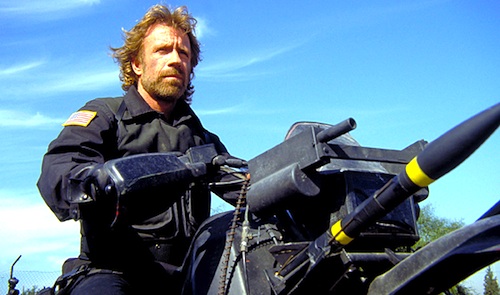By Joe Bendel. Turning Superman into a bomb-banning peacenik was an idea destined to fail. Nobody should have understood that better than the men who brought the world the American Ninja franchise. Unfortunately, they got caught up in the deal and the predictable failure of Superman IV: the Quest for Peace spelled the beginning of the end for scrappy Cannon Films. The rise and fall of the self-made, 1980s defining moguls Menahem Golan and Yoram Globus are chronicled in Hilla Medalia’s The Go-Go Boys: the Inside Story of Cannon Films, which screens during the 2015 New York Jewish Film Festival.
While working in his native Israel, Menahem Golan attained a level of international respect for films that combined popular appeal with critical respectability, such as his Oscar nominated Operation Thunderbolt. His first English language productions were not so successful, but he kept trying until he found the right formula. Indeed, formula would be the right word. With his cousin, Yoram Globus, Golan acquired Cannon Films, turning it into the little studio that could, by releasing a series of cheaply produced but highly satisfying action movies.
With a regular stable of stars that included Chuck Norris (including the Delta Force and Missing in Action series), Charles Bronson (especially the Death Wish sequels), Michael Dudikoff (American Ninja), and a Belgian waiter named Jean-Claude Van Damme, Cannon became the action house of its era. Any guy who remembers the 1980s will have fond memories of Cannon. When Golan and Globus respected their competitive advantages, they were wildly profitable. In fact, Cannon became notoriously successful pre-selling films they had not yet made (a standard practice these days), largely on the strength of the stars they had signed and a bankable concept.
Even dabbling in art cinema did not doom the Cannon empire. The same team behind Ninja III: the Domination (a longstanding fan favorite) also scored an Academy Award for foreign language film for the Dutch WWII drama The Assault. In some cases, they even leveraged distribution for prestige pictures with their signature action movies. Unfortunately, when the more artistically ambitious Golan convinced the fundraiser-extraordinaire Globus to start bankrolling traditional studio level budgets, the box office results were disastrous.

Anyone who loves martial arts films and B-movies will inhale Go-Go Boys. Medalia scored long in-depth sit-down interviews with the late Golan and the surviving Globus, even capturing their reunion after years of estrangement. She also talks to most of the principle supporting players, including a highly animated Van Damme and a more reflective Dudikoff. It is also nice to see Andrei Konchalovsky get his due as a Cannon artist (most notably for Runaway Train). However, the oversight of the late great cult action star Steve James, who played an important role in many iconic Cannon hits, is frankly inexcusable.
Clearly in retrospect, Cannon never should have never bothered with the middling middle ground. Their bread-and-butter action films like Avenging Force and Bloodsport still hold up to this day, while their art house releases, such as Norman Mailer’s Tough Guys Don’t Dance and Godard’s King Lear remain distinctive for their idiosyncrasies. For the most part, Medalia gives them their due in a breezily affectionate profile. Even though the absence of James will annoy fans, The Go-Go Boys is still recommended for cult film connoisseurs when it screens twice this Thursday (1/29) at the Walter Reade Theater, as part of this year’s NYJFF.
LFM GRADE: B
Posted on January 26th, 2015 at 5:56pm.